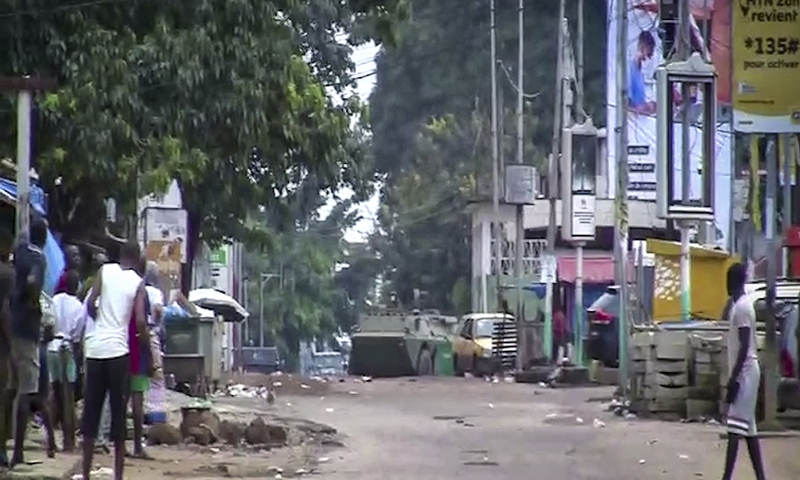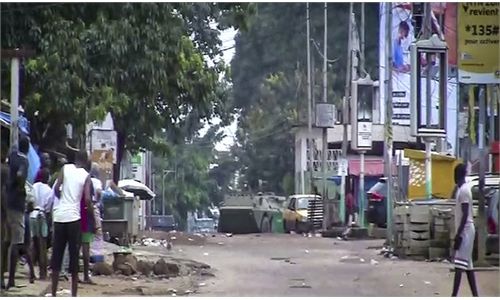
In this image made from video, residents watch as an armored personnel carrier is seen on the streets near the presidential palace in the capital Conakry, Guinea Sunday, Sept. 5, 2021. Photo: CFP
A military coup has cast a shadow of uncertainty over the economic and trade situations in Guinea, and several Chinese business representatives and companies have seen disruption, but they are maintaining a wait-and-see attitude about the future of their businesses in the West African state.
With the country's president Alpha Condé now in custody and an indefinite curfew being imposed, the coup that took place on Friday shocked the world, with some governments and international organizations expressing concerns.
The incident immediately sparked concern among industry players about the possible disruption to their current and future businesses.
An employee of Grand Hotel De Conakry located in the capital of Guinea said on Tuesday that the hotel business was being affected by the complex political situation.
"Our hotel cannot accept new guests as we were told by the current government to close, but we can still serve those who had already checked in," said the employee.
But she has little concern about not having enough guests in the future because the hotel has multiple cooperation partners to ensure an adequate income.
"The normal operation of our hotel has been discussed recently among government authorities, but I cannot ensure when the discussions will be finished," she said.
A trader surnamed Dai, who does business in automobile-related items, said that local clients in Guinea had reduced some export orders due to fear of potential risks after the coup.
In response to the rising uncertainty in the country, some Chinese businesspeople have suspended their operations and tried to stay inside, while holding a wait-and-see attitude toward developments, the vice president of the Chinese Chamber of Commerce in Guinea -- who goes by the name of Jack -- told the Global Times on Monday evening.
"We will follow closely what the Chinese Embassy tells us to do," Jack said.
Chinese companies have been among the most active participants and supporters of the country's economic and trade development, with businesses ranging from mining to ports, hydropower stations and fishing.
The famous Simandou project, the world's largest undeveloped iron ore deposit that's being worked on through the joint participation of several Chinese and foreign companies, has been the center of attention after the coup.
An official in the economic and commercial office of the Chinese Embassy in Guinea told the Global Times on Monday that "now the country has set up a transitional committee, with the former deputy head of each ministry temporarily in charge, and at the government level, there has been little impact on Chinese enterprises."
However, the official warned of possible adverse effects that the coup could have on existing and future Chinese investment, including the possibility for the new government to seek to review signed contracts and terms, including diluting the shares held by Chinese investors.
All companies should have contingency plans, improve security awareness, and ensure the safety of personnel and property, while actively tracking the requirements of the new government for mining companies, the Chinese Embassy official said.
The situation is continuing to ferment, with many lingering questions. A businessperson surnamed Wang who has been doing trade, mining and other resource-related businesses there for years, told the Global Times that so far, there has not been much impact on his business, and he can still be involved in international trade.
Wang said the biggest impact on business after the coup is the great uncertainty over the future.
Despite the unclear situation, Wang said that he has chosen to stay unless some extreme things happen, because "there are many more opportunities for Chinese businesses in the country, and the market is not very competitive."



